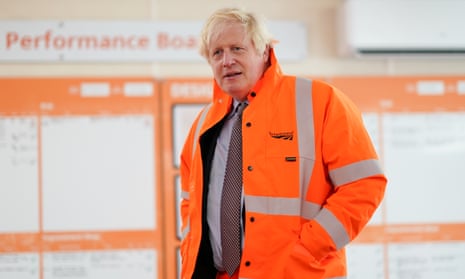Another day, another assault by this government on the very voters who gave it such a stonking majority. The change in social care subsidies in England, sneaked out under the shield of their own sleaze scandal, is a finely targeted strike on older, less affluent homeowners living in northern English seats. These are the very people Boris Johnson now likes to claim as his own. His manifesto promise, repeated time and again, was that people would not lose their homes through the unlucky “bolt from the blue” of needing care in old age. Well, now they will.
With a new manipulation of the figures that create an £86,000 cap on care costs, the Treasury claws back some of its high cost – but all of it taken from those with less valuable assets. On the same day, another missile lands on his target voters: the northern rail promises hit the buffers – forget Bradford, forget Leeds. How reckless that in such a short time two key “red wall” promises Johnson made in 2019 have become serious electoral liabilities.
All the attention has been on who should pay for social care, and how much. But that should be a sideshow, as it doesn’t touch the real catastrophe: lack of care, low standards and blocked NHS beds. Instead, Johnson only made a manifesto pledge on “catastrophic” costs to homeowners, because how much people leave in inheritances is a powerfully emotive electoral issue: inheritance tax is the most unpopular, by far. That’s why it raises too little, after decades of wildly escalating property values.
The real crisis is the 1.5 million people denied enough care, people who would have received it in 2010, according to Age Concern. Frail people being left at home alone without support, as care is increasingly rationed, is the real “catastrophe”. So is the low quality of care: with 15-minute home visits, and the inadequacies in service provision found in Care Quality Commission inspections. The King’s Fund says many of these services never improve. Difficulty in recruiting staff may make improvement even harder.
Wasn’t this all “fixed” with the £12bn national insurance rise – the increase the Conservatives called the health and social care levy? Despite that unfair NI burden on working-age people, only £5.4bn is destined for social care over the next three years, and £3.7bn of that is needed by councils, to cover the cost of the £86,000 care cap and extend the means test. After that’s taken into account, local authorities have only a 1.8% annual increase in spending power to cover each year’s rapidly accelerating number of the elderly and disabled people needing care, according to Simon Bottery, the King’s Fund’s social care analyst.
Meanwhile, as the NHS crisis grows, Amanda Pritchard, the head of NHS England, joined the chorus of pleas this week from within the NHS for more social care provision. The lack of NHS beds, many occupied by people waiting for social care, causes blockages in A&E, and the pile-up of ambulances we have seen outside hospitals. How many NHS beds are blocked? Conveniently, last year the government paused counting and publishing those figures.
Remember that “oven-ready plan”? There is no social care plan, only a homeowners’ inheritance plan. There is no plan to reorganise the shambolic patchwork of care providers; so many understaffed, while others are in debt to private equity firms. With 100,000 vacancies in the sector, and the number growing, the Tories have no care workforce plan. We need a national care service, with pay and career paths integrated with the NHS.
Here’s the political problem. Social care consumes more than 40% of English local authority spending, yet only 2% of their voters use it at any one time. Everyone hopes not to need it, few understand its fiendish complexity, but everyone with any assets now knows they risk paying out £86,000, plus £200 a week in living costs. That threat concerns many more voters than may ever pay it, which is why all the money has gone on saving inheritances, not on care. But what political ineptitude from Johnson to upset the very people he was supposed to soothe.
Emotions about inheritance are not amenable to reason. The best plan was in Labour’s 2010 manifesto, and was designed to pool risk for everyone: the proposal was that everyone with assets would put in a relatively low lump sum upon retirement (about £20,000 in cash, or a lien on a property), and then everyone would receive decent free care if and when they needed it. The Tories killed it off as a “death tax”. But they have never put forward a plan for paying for social care – and there isn’t one now.
Polly Toynbee is a Guardian columnist

